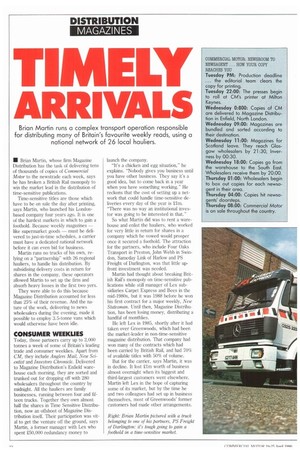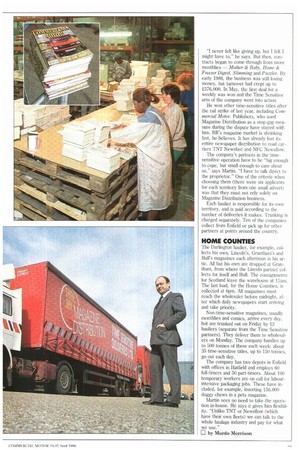MEL1T
Page 34

Page 35

If you've noticed an error in this article please click here to report it so we can fix it.
ARRIVALS
Brian Martin runs a complex transport operation responsible for distributing many of Britain's favourite weekly reads, using a national network of 26 local hauliers.
• Brian Martin, whose firm Magazine Distribution has the task of delivering tens of thousands of copies of Commercial Motor to the newstrade each week, says he has broken a British Rail monopoly to win the market lead in the distribution of time-sensitive publications.
Time-sensitive titles are those which have to be on sale the day after printing, says Martin, who launched his Londonbased company four years ago. It is one of the hardest markets in which to gain a foothold. Because weekly magazines — like supermarket goods — must be delivered to just-in-time schedules, a carrier must have a dedicated national network before it can even bid for business.
Martin runs no trucks of his own, relying on a "partnership" with 26 regional hauliers, to handle his distribution. By subsidising delivery costs in return for shares in the company, these operators allowed Martin to set up the firm and absorb heavy losses in the first two yers.
They were able to do this because Magazine Distribution accounted for less than 25% of their revenue. And the nature of the work, delivering to news wholesalers during the evening, made it possible to employ 3.5-tonne vans which would otherwise have been idle.
CONSUMER WEEKLIES
Today, those partners carry up to 2,000 tonnes a week of some of Britain's leading trade and consumer weeklies. Apart from CM, they include Anglers Mail, New Scientist and Investors Chronicle. Delivered to Magazine Distribution's Enfield warehouse each morning, they are sorted and trunked out for dropping off with 280 wholesalers throughout the country by midnight. M the hauliers are family businesses, running between four and fifteen trucks, Together they own almost half the shares in Time Sensitive Distribution, now an offshoot of Magazine Distribution itself. Their participation was vital to get the venture off the ground, says Martin, a former manager with Lex who spent £50,000 redundancy money to
launch the company.
"It's a chicken and egg situation," he explains. 'Nobody gjve s you business until you have other business. They say it's a good idea, but to come back in a year when you have something working." He reckons that the cost of setting up a net work that could handle time-sensitive de liveries every day of the year is Lim. "There was no way an institutional investor was going to be interested in that."
So what Martin did was to rent a warehouse and enlist the hauliers, who worked for very little in return for shares in a company which he vowed would prosper once it secured a foothold. The attraction for the partners, who include Four Oaks Transport in Preston, John Webb in Swindon, Sameday Link of Harlow and PS Freight of Darlington, was that little upfront investment was needed.
Martin had thought about breaking British Rail's monopoly on time-sensitive publications while still manager of Lex subsidiaries Carpet Express and Bees in the mid-1980s, but it was 1988 before he won his first contract for a major weekly, New Statesman. Until then, Magazine Distribution, has been losing money, distributing a handful of monthlies.
He left Lex in 1985, shortly after it had taken over Greenwoods, which had been the market-leader in non-time-sensitive magazine distribution. 'That company had won many of the contracts which had been carried by British Rail, and had 70% of available titles with 50% of volume, But for the carrier, says Martin, it was in decline. It lost Lim worth of business almost overnight when its biggest and third-largest customers went elsewhere. Martin left Lex in the hope of capturing some of its market, but by the time he and two colleagues had set up in business themselves, most of Greenwoods' former customers had made other arrangements.
"I never felt like giving up, but I felt I might have to," he says. But then, contracts began to come through from more monthlies — Mother & Baby, Home & Freezer Digest, Slimming and Puzzler. By early 1988, the business was still losing money, but turnover had crept up to £576,000. In May, the first deal for a weekly was won and the Time Sensitive arm of the company went into action.
He won other time-sensitive titles after the rail strike of last year, including Commercial Motor. Publishers, who used Magazine Distribution as a stop-gap measure during the dispute have stayed with him. BR's magazine market is shrinking fast, he believes. It has already lost its entire newspaper distribution to road carriers TNT Newsfast and NFC Nevvsflow.
The company's partners in the timesensitive operation have to be "big enough to cope, but small enough to care about us," says Martin. "I have to talk direct to the proprietor." One of the criteria when choosing them (there were six applicants for each territory from one small advert) was that they must not rely solely on Magazine Distribution business.
Each haulier is responsible for its own territory, and is paid according to the number of deliveries it makes. Trunking is charged separately. Ten of the companies collect from Enfield or pick up for other partners at points around the country.
NOME COUNTIES
The Darlington haulier, for example, collects his own, Lincoln's, Granthain's and Hull's magazines each afternoon in his artic. All but his own are dropped at Grantham, from where the Lincoln partner collects for itself and Hull. The consignments for Scotland leave the warehouse at 11am. The last load, for the Home Counties, is collected at 6pm. All magazines must reach the wholesaler before midnight, after which daily newspapers start arriving and take priority.
Non-time-sensitive magazines, usually monthlies and comics, arrive every day, but are trunked out on Friday by 12 hauliers (separate from the Time Sensitive partners). They deliver them to wholesalers on Monday. The company handles up to 500 tonnes of these each week: about 35 time-sensitive titles, up to 150 tonnes, go out each day.
The company has two depots in Enfield with offices in Hatfield and employs 60 full-timers and 50 part-timers. About 100 temporary workers are on call for labourintensive packaging jobs. These have included, for example, inserting 156,000 doggy chews in a pets magazine.
Martin sees no need to take the operation in-house. He says it gives him flexibility. "Unlike TNT or Newsflow (which have their own fleets) we can talk to the whole haulage industry and pay for what we use."
D by Murdo Morrison








































































































































